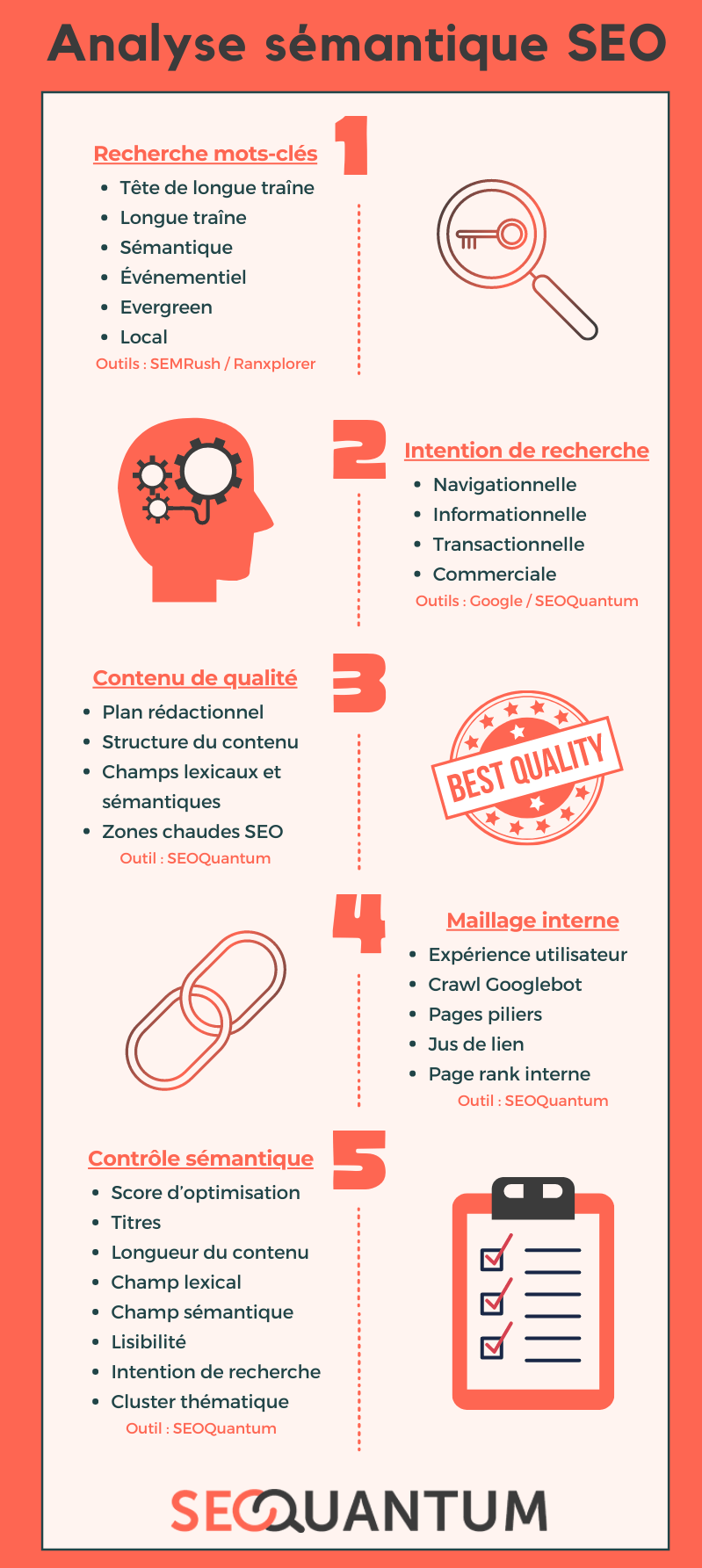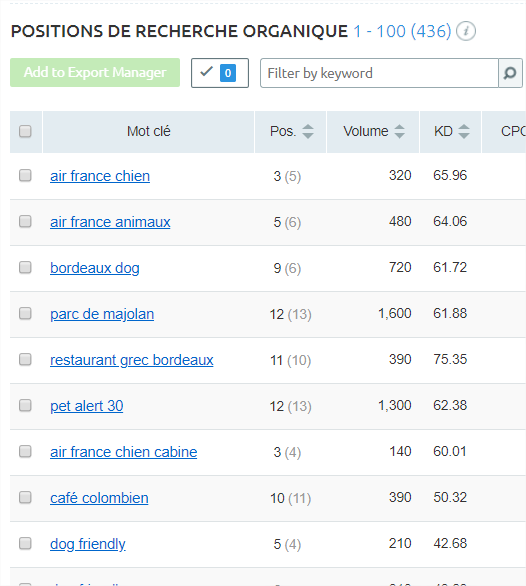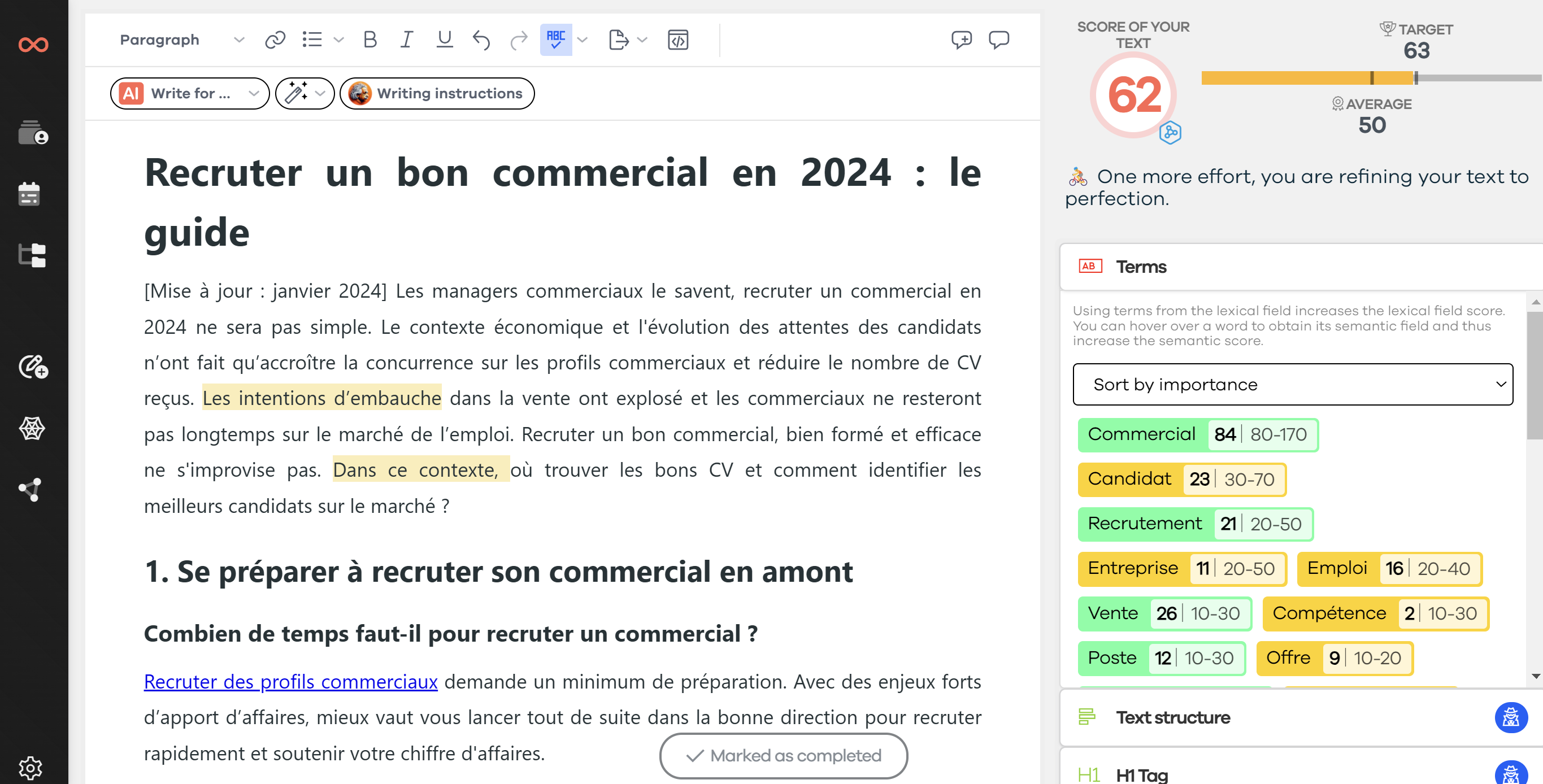Is your organic traffic not taking off? Is your website not visible on search engines? Discover an expert SEO technique: semantic SEO analysis! It allows you to find the keywords that match your business, understand the needs of your audience, and much more! To learn everything about this topic and boost your traffic, just read on.
🚀 Quick Read: One minute to learn the 5 steps of a semantic SEO analysis

🧐 SEO Definition of a Semantic Analysis
Before talking about semantic SEO analysis, you must understand what the semantic field in natural referencing is. To write a pleasant text to read, you must first use a rich vocabulary by varying your lexical field. Semantics then allows you to give meaning to the terms used within a sentence. This is particularly necessary when you use a word that has different meanings (for example, "foot" for a table or the human body).
When we talk about semantic analysis in SEO, we are referring to the meaning of the words present on a web page and, by extension, on an entire site. As a result, it allows you to find the keywords that enable your visibility on the Internet and assert the general theme of your site. This step should be done as a priority when setting up your SEO strategy. However, if your content is already online, you can still perform a semantic audit to assess the health of your website.
❓ Why Conduct a Semantic SEO Study?

As is often the case in organic referencing, the goal of this SEO concept is twofold: enhance the user experience (UX) and improve the work of indexing robots. And of course, you will benefit greatly by seeing your traffic from search engines skyrocket!
Addressing Search Intent
By working well on the semantics of your texts, you improve the reader's comfort (less repetition and more precision). Moreover, you perfectly address the search intent of Internet users. Indeed, since your sentences are well detailed, they provide all the details expected by your visitor.
Also, be aware that this technique is very useful for adapting your content to voice search. Indeed, these searches are generally long and precise (we then speak of long-tail). Thus, by working on the semantics of your content, you better match this type of query. Note that 27% of Googlers prefer voice search to find a relevant result!
Improve Your Organic Ranking
As you have already understood, performing a semantic SEO analysis allows you to position your texts on unique, precise, or complicated queries. But that's not all! There is no doubt that offering a semantic field proves the relevance of your content to Google. This has been the case since the update of the Google algorithm known as Hummingbird and the search engine's recommendations known as "EAT".
Another SEO advantage, the semantic study allows you to create a complete architecture for your site. Thus, by covering an entire given subject, you demonstrate your level of expertise to Google. As a result, when an Internet user performs a search corresponding to your theme, your pages are highly favored on the search engine's results pages. To achieve this, you can either create a tree structure using topic clusters, or (even better!) define a keyword strategy by keyword clustering.
🎛 How to Perform a Semantic SEO Analysis?

For a semantic SEO analysis to be effective, it must follow a precise procedure. Here are the 5 key steps you should not overlook!
1. Keyword Research
Keyword research is always the basis of an SEO strategy. Indeed, to improve your visibility on search engines, you must determine the words that perfectly represent your business and interest your audience. For this to be effective, remember the 6 types of keywords in natural referencing!
- Head of long-tail: short search (maximum three words).
- Long-tail: long search (more than three words).
- Semantic keyword (related to your main query).
- Event keyword (short-term visibility, related to current events).
- Evergreen keyword (long-term visibility, timeless).
- Local keyword (essential for geolocated referencing).
2. Understand the Needs of the Internet User
During this phase, you must first accurately define your SEO persona. It's obvious that only with a perfect knowledge of your readership can you meet their needs! Secondly, you want to understand the search intentions related to the different keywords you have chosen. To do this, analyze Google's SERP while always keeping in mind the 4 types of intent that lie behind a query.
- Navigational search: to find a specific business or site.
- Informational search: most often in the form of a question.
- Transactional search: helps with decision-making for a purchase (product or service name).
- Commercial search: allows for making the best decision for a purchase (comparison, best price, etc.).
3. Write Quality Content
Now that you know your keywords and are aware of the user's intent, you can write your content. However, it's not about doing it hastily! Indeed, the quality of your content is essential to please your reader and improve your ranking on Google. Offering quality content and optimizing the semantic field is then crucial at this stage!
In addition, take the time to properly structure your blog article or referencing text and optimize your content for SEO. Think about placing your main queries and offering variations of your main words in the hot zones of your content. In fact, placing keywords correctly is a significant factor for your positioning on search engines.
4. Work on Internal Linking
Internal linking is a very important element for your SEO! First, it allows you to offer additional information to your reader, which can help answer their search intent. Moreover, you help the Googlebot crawl your entire site (and thus not forget old content). Finally, you share "link juice" with your landing pages.
Thus, the internal page rank (PRi) of your entire site improves. In addition, you can also control the notoriety you attribute to your different pages. As a result, you have control over your site and can favor the referencing of your content pillars (the most important for your SEO and target readers).
5. Check Semantics
To complete the semantic SEO analysis, you should always check the optimization score you get once your text is written. To do this, you could spend time (a lot!) comparing your text with those offered in the top Google results. Moreover, if you don't have much experience and your level of knowledge is not sufficient, this study may prove ineffective.
That's why the best solution is to use a high-performance semantic analysis tool. You save time and benefit from artificial intelligence similar to that of search engines. In the next chapter, I suggest 4 tools you could use to achieve this goal.
🛠 SEO Tools for Semantic Analysis
An SEO strategy always starts with a brainstorming step. However, to be comprehensive, effective, and perfectly targeted, the use of referencing tools is mandatory. Here are 3 SEO tools you should not overlook!
1. Google: The basis for understanding search intent and finding keywords
To accurately understand the search intent of Internet users, a visual analysis of the SERP is necessary. At a glance, you understand the type of query hidden behind a keyword. Do you find comparisons? It's a commercial query! Do you notice products at the top of the results page? Then it's a transactional query! Etc.

You can also take advantage of Google's results page to find other content ideas. Indeed, taking into account the "other questions asked" and "related searches" is an excellent way to develop a subject in its entirety while meeting the needs of Internet users.
2. SEMRush: The must-have for knowing the best keywords and their search volume
Once your initial list of keywords is established, you can move on to the next step using SEMRush. This comprehensive tool is undoubtedly the favorite of professional SEOs. It is particularly useful at the beginning of your semantic SEO analysis to find all the keywords that match your general theme. To do this, don't hesitate to crawl the sites of your SEO competitors!

Although the search volume can sometimes be tempting, I advise you not to focus on it! Indeed, the words searched thousands of times per month are often extremely competitive. That's why you should first work on the entire semantic cocoon of your main subject. By proving your expertise to Google in this way, you will then have a chance to appear on these competitive queries.
3. SEOQuantum: The Semantic Analysis Specialist
SEOQuantum is the only French SEO tool that takes into account all SEO factors related to semantics. During a semantic SEO analysis, it is essential for:
- creating a thematic cluster strategy,
- structuring content,
- knowing the lexical and semantic fields to add to your text,
- checking optimization scores for each URL,
- performing a complete semantic audit of your site
- and more!

To please your readership, improve your Google ranking, and attract more organic traffic, semantic analysis is the ultimate weapon! Indeed, it allows you to find the right keywords, meet the expectations of Internet users, write quality content, improve the relevance of your content, and assert the expertise of your site on a given theme.
Have you managed to achieve all these goals without performing a semantic SEO analysis? This may be the case if your theme is extremely niche! However, if you want to stabilize your site in the top Google results, you should definitely consider this technique.
Still in doubt? Here's a concrete example of this ultimate SEO technique: "How Semantics Saved My Business! Case Study".
Need to go further?
If you need to delve deeper into the topic, the editorial team recommends the following 5 contents:

